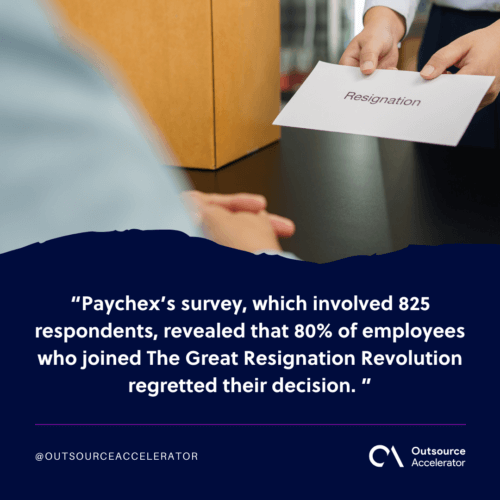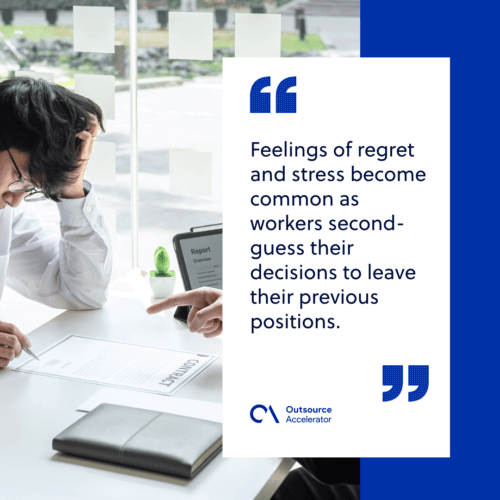The Great Regret: A consequence of The Great Resignation?

The Great Resignation, a term coined to describe the unprecedented wave of employees leaving their jobs during the COVID-19 pandemic, has reshaped the modern workplace.
Many sought better opportunities, work-life balance, or a chance to reevaluate their career paths. However, as time progresses, a new trend is emerging: The Great Regret.
In this article, we’ll explore how workers’ initial enthusiasm for The Great Resignation is giving way to a growing sense of regret. We’ll also delve into some of the impacts and lessons learned from this shift.
The Great Regret: An overview
The Great Regret is a recent occurrence following the wave of The Great Resignation. Many employees who left their jobs in search of greener pastures are now experiencing remorse.
Paychex’s survey, which involved 825 respondents, revealed that 80% of employees who joined The Great Resignation Revolution regretted their decision.

Initially driven by the desire for improved work-life balance, higher pay, or career fulfillment, these individuals found that their new roles had not met their expectations.
From The Great Resignation to The Great Regret, these trends highlight the complexities of career changes and underscore the importance of carefully evaluating job moves.
As more workers express resentment, both employees and employers are gaining insights into the labor market’s evolving dynamics and the true costs of turnover.
4 major cause of The Great Regret
The Great Resignation has been fueled by a myriad of factors reshaping the modern workforce. Here we have the four major drivers behind this phenomenon:
1. Impulsive career changes
Impulsive career changes occur when individuals make abrupt decisions to leave their jobs without thorough consideration of the potential consequences.
These decisions may be driven by emotions, such as frustration or burnout, leading individuals to seek immediate relief without evaluating long-term implications.
2. Mismatch in career expectations
A mismatch in career expectations arises when employees’ perceptions of their roles and career prospects do not align with the reality of their work environment.
This disconnect often stems from a lack of clarity about job responsibilities, growth opportunities, or company culture. In the end, staff feel dissatisfied and decide to leave.
3. Economic market shifts
Economic market shifts, such as the following, can prompt individuals to reassess their career paths:
- Recessions
- Industry disruptions
- Technological advancements
Changes in market demand, job availability, or industry stability may influence workers to seek new opportunities that offer better security or alignment with emerging trends.
4. Loss of stability
Loss of stability refers to the erosion of job security or financial stability, which can occur due to factors like:
- Company downsizing
- Restructuring
- Economic instability
When employees perceive their current roles as precarious or unsustainable, they may opt to leave in pursuit of more stable employment elsewhere.
The Great Regret: Impact on workers and businesses
The Great Regret has left everyone with unexpected challenges. This wave of second-guessing and reconsideration has significant implications for both businesses and workers.
The Great Regret: Impact on workers
For employees, its effects are as follows:
- Career instability. Workers experience increased career instability, leading to financial stress and uncertainty.
- Job dissatisfaction. Many workers find their new roles do not meet expectations, leading to lower job satisfaction and morale.
- Regret and stress. Feelings of regret and stress become common as workers second-guess their decisions to leave their previous positions.

- Frequent job changes. This trend can result in fragmented career paths and difficulties in establishing long-term career progression.
- Adjustment challenges. Adapting to new workplaces, cultures, and roles can be challenging and stressful for workers.
- Skill mismatch. Workers may find themselves in roles that do not fully utilize their skills or align with their career goals.
- Impact on mental health. The psychological impact of job dissatisfaction and regret can negatively affect mental health and overall well-being.
- Learning opportunities. On a positive note, some workers gain valuable insights and learning experiences from their varied job experiences, which can be beneficial in the long run.
The Great Regret: Impact on businesses
As for the employers’ end, they had to face the following:
- Increased turnover rates. Businesses face higher turnover rates as employees who left and later regretted their decisions seek to return or move on again.
- Rehiring challenges. Companies must navigate the intricacies of rehiring former employees who left during the Great Resignation, including negotiating terms and rebuilding trust.
- Recruitment costs. Elevated recruitment and training costs arise from the continuous cycle of hiring and replacing staff.
- Workforce instability. The instability in staffing levels can disrupt business operations and hinder long-term planning.
- Talent shortages. Persistent vacancies may lead to talent shortages, affecting productivity and service quality.
- Shift in employee expectations. Businesses must adapt to shifting employee expectations regarding work-life balance, remote work, and job satisfaction.
- Focus on retention strategies. Companies are investing more in retention strategies, such as enhanced benefits, career development opportunities, and improved work environments.
- Reputation management. Managing corporate reputation becomes critical as companies strive to attract and retain talent amidst widespread job dissatisfaction.
The Great Regret: A lesson learned for both employees and employers
The Great Regret has created a dynamic and often turbulent environment for both businesses and workers. This phenomenon necessitates adaptive strategies and robust approaches to navigate the evolving job market.

It served as a reminder of the complexities of the modern job environment and the importance of making informed and strategic decisions.
For businesses, fostering a supportive and engaging workplace is key to retaining talent. In terms of workers, thoughtful career planning and alignment with personal values are essential to achieving long-term satisfaction and success.
Both parties must learn from this period to build more resilient and fulfilling employment relationships.







 Independent
Independent




